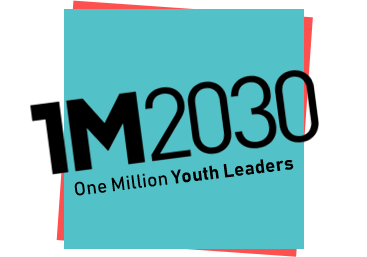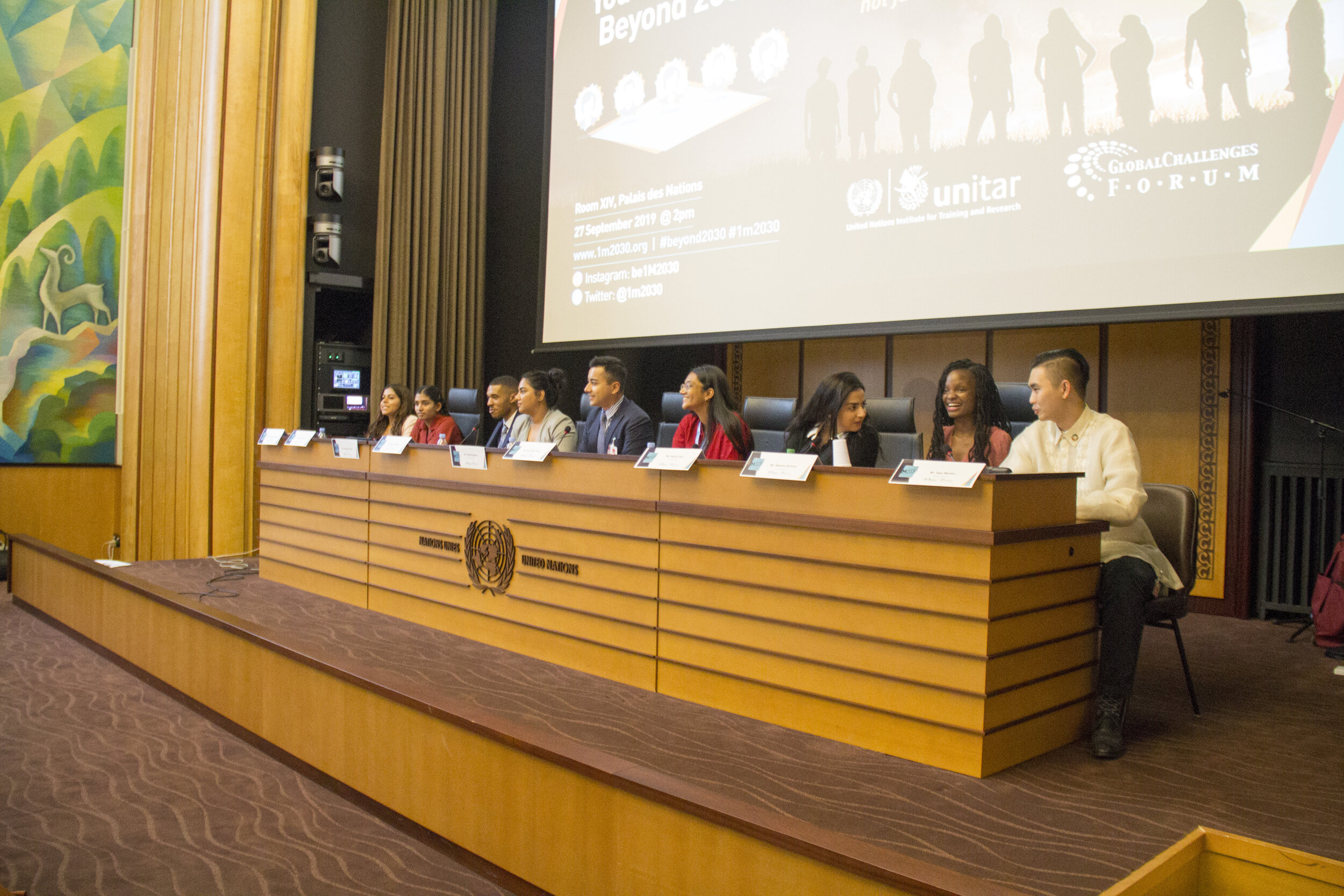1M2030: UN Youth Leadership Development Programme
By Dr. Moses Satralkar
MISSION: The Global Challenges Forum Foundation (globalchallengesforum.org) has been established as a think tank headquartered in Geneva to create strategic global networks to overcome specific challenges in different countries. Acknowledging that 1.7 billion people on the planet are in the age group of 15-24 years, and that over 80% of the world’s youth lives in developing countries, a special project on developing a network of 1 Million Youth Leaders by 2030 (1m2030.org), has been established in conjunction with the prestigious United Nations Institute of Training and Research (UNITAR) in Switzerland. Dr. Walter Christman, USA, the Founding Chairman of the Global Challenges Forum says that “The 1M2030 has a vision to fulfill the United Nations Sustainability Development Goals (UNSDG’s) by creation of a network of 1 million youth leaders and entrepreneurs by 2030 and beyond, across the world, with a focused effort on developing countries”.
The Global Challenges Forum (GCF) is actively engaged in creating a network of paid partner members including educational institutions, corporations, business houses private, government and non government organizations to sponsor sustainable development projects; as well as organize study tours, and conferences at the United Nations every year. The Secretariat comprises of talented professionals keen on social transformation. Educators and professionals working in national and international schools as well as colleges and universities are encouraged to educate students on the 17 UN Sustainability Goals; plan study tours to the United Nations, and participate in the Model United Nations events to nurture young students as conscientious global citizens who could play a pivotal role in making their world’s a more peaceful and equitable society.
We encourage aspiring youth leaders and volunteers who are interested in fulfilling the UN SDG’s, to register on the 1M2030 website. Our database of youth is growing and we plan to create a databank of a 1,000,000 youth over the next decade. Each registered young person will be educated and encouraged to focus on one sustainable developmental goal as part of his or her life’s calling, and in turn motivate others to do so. 1M2030 partner members will be meeting for an Annual 1M2030 Youth Leadership Conference at the UN in Geneva, Switzerland or in New York, USA. Several students from international cchools, colleges, and universities in developing nations particularly Asia, Middle East and Africa are being mobilized through digital/social media, and regional conferences.
LAUNCH EVENT: The 1M2030 movement was launched in Geneva on the September 27, 2019. This event was a follow up of the Delhi Proclamation made in India in 2018. The 1M2030 Secretariat handpicked 9 ‘spotlight speakers’ who represented seven countries. These youth members presented a short speech (similar to the TEDx talks), on how they had implemented one UNSDG goal for social welfare in their respective communities. This session witnessed engaging and invigorating deliberations capturing the essence of youthful energy, passion and creative career aspirations of the young audience. Speakers were duly certified. The programme also had an inspiring panel discussion of five career professionals, representing different countries. Dr. Moses Satralkar, represented India as a panelist.
Mr. Nikhil Seth, the UN Assistant Secretary-General, Executive Director of the United Nations Institute for Training and Research (UNITAR), offers his opening remarks to the 1M2030 launch.
The day’s events commenced with a powerful keynote address by one of USA’s top CIO’s Dr. Michael Matthews, vice president of Oral Roberts University, and ended with a brilliant exhortation by Dr. Walter Christman who announced the formulation of a Youth Leadership Committee comprising the Spotlight Speakers, and establishment of a new Global Resilience Consortium in Geneva. A group of 40 students from the Timpany Schools, Hyderabad, India attended the event. The workshop and launch conference was organized by Sebastian Hofbauer and Julia Genth, international relations experts working at the United Nations Institute of Training and Research. A total of 140 leaders and youth from several countries assembled to launch the movement, making the event a grand success.
CASE STUDY OF INDIA FOR YOUTH MOBILIZATION:
The UN General Assembly President Maria Fernanda Espinosa recently commented that “India is a very important player of the multilateral system. It is a friendly country to the United Nations. If India succeeds in the achievement of the 2030 Agenda, we are estimating that 1.3 billion people will benefit this positive impact can change the face of the world.” India has the strength of a youthful profile. The average age of German citizens is 46.5 years, Japan is 46.1 yrs. UK’s average age is 40.4 yrs and USA’s is 37.6 yrs. In comparison, India’s median age is only 27.6 yrs. and India is set to become the youngest country by 2020 with an average age of 29 yrs. More than 50% of our country’s population is less than 25 years of age and aspires for higher education. Thus an enlightened youth and teacher fraternity can propel global evolution rapidly. Teachers, Professors and Management personnel need to empower this awakening in the hearts and minds of youth today, for evolution of a better world tomorrow.
APPEAL OF THE UN SUSTAINABILE DEVELOPMENT GOALS:
The United Nations Development Programme define the Sustainable Development Goals (SDG’s), or the Global Goals, as “a universal call to action to end poverty, protect the planet and ensure that all people enjoy peace and prosperity.” The of 17 goals divided into a total of 169 targets set by the UN General Assembly in 2015, as part of the wider 2030 Agenda for Sustainable Development, building upon the Millennium Development Goals.
There 17 goals cover the most pressing issues of global development like poverty, hunger, education, gender disparity and sanitation especially in left behind communities worldwide. These goals are not solely those of the United Nations, or the governing bodies of the signatory countries, they belong to all of us who are conscientious global citizens.
As we step into the second five-year period, and the final decade of Agenda 2030, we need to ensure an active recalibration and redefinition of our ideas, visions and strategies at Educational Institutions, to prepare ourselves ito attain the 17 sustainable development goals of the United Nations.
The above article is authored by Dr. Moses Satralkar, Associate Director, Global Challenges Forum, Geneva.
It originally appeared in India’s Education World Magazine, accessible here.



